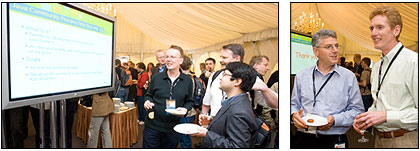By Susan Mitchell
The month of May does not come to San Francisco only with spring colors. It brings with it the
unmistakable Java spirit which for a week becomes the pulse at which the heart of the City beats,
the air San Franciscans breathe (better this year as the JavaOne conference goers were encouraged
by the show organizers to choose the bicycle as their means of transportation to the event) and the
(byte) code they live by for five days.
 |
|
| Liz Kiener |
 |
On the Monday before the JavaOne Conference official opening, 20 JCP members came from Russia, India, New Zealand,
and other places for training. The training led by Liz Kiener
of the Program Management Office (PMO) targets new or potential Spec Leads who want to learn how to guide a Java
Specification Request (JSR) through the ins and outs of the JCP program. Chief technology officers, chief
scientists, managers, program managers, and others participated in the training to discover what was new or
how they could help the Experts and Spec Leads they oversee.
The training session introduced the PMO jargon, conventions, protocols, common errors,
and understood niceties associated with the process of creating and guiding a JSR. One of the more useful tidbits that Spec
Leads aspiring to Star status learned is that as long as they keep the PMO informed and the schedule on their community page
updated, a JSR is considered "on time."
 |
|
| Graham Hamilton |
 |
Schedules may be more aggressive now. Because last year's update to version 2.6 of the JCP program required Expert
Groups to operate more transparently and to submit EDRs earlier in the process, JSRs are zipping through the process
twice as fast as they did under previous versions of the program. Graham Hamilton, VP and fellow on the Java platform
team at Sun Microsystems, and JCP SE/EE Executive Committee representative as well as other JavaOne speakers noted that
the revised process is also having the intended effect of gaining more and better feedback from the JCP community,
producing higher quality specifications.
Community communication matters, and Corina Ulescu, the
public relations manager for the PMO, suggested several ways to tap into the program’s resources to promote
JSRs. Putting to work new PR technologies including blogs, podcasts, Really Simple Syndication (RSS) feeds, and wikis
can certainly help this effort. "A PR person can connect you to the right beat reporter, assist with informing
press about JSRs and other JCP program news and updates of importance to Java developers. Communicating about a JSR
is part of that standard’s success and Spec Leads’ success is the Java community's success," she
commented during a presentation to Spec Leads at the JCP Training Session.
Each year, JCP members submit proposals for JavaOne talks, anticipating the opportunity to educate developers about the scope,
purpose, and usage of Java technology based standards they have helped develop. As a result, key JSRs were discussed at the
JavaOne conference in general sessions, birds-of-a-feather sessions (BOFs), classes, and at the Sun Microsystems booth in the Pavilion.
 |
JCP Press Roundtable |
 |
|
| Jonathan Schwartz |
 |
Conference attendees were called to action to join the JCP Program by Sun CEO Jonathan Schwartz who in his Conference
opening keynote referred to the unique opportunity developers have to be part of a thriving community that is tightly
connected to Java technology's present and, very important to its future. Conference participants dropped by the JCP
pod in steady numbers to check out the program that generated so much buzz. JCP members stopped to say hello and check
out a prototype of the upgraded jcp.org website to be launched this summer. JCP members are pleased with the practical
features such as support for international character sets and RSS feeds for each JSR. Discussions of JSRs will be
posted and organized by threads to minimize the duplication of questions and suggestions. Better tools will automate
many of the Expert Group maintenance and communication chores and enable collaboration on working drafts. Senior
software developer Hamid Ben Makels represents Fujitsu Ltd. on the Executive Committee (EC), and he looks forward to
the website improvements, which will make it easier to monitor the status of JSRs.
Any streamlining of the workload is welcomed by Spec Leads, who expend copious amounts of time and energy launching and
guiding the development and revision of JSR Application Programming Interfaces (APIs), Technology Compatibility Kits (TCKs),
and Reference Implementations (RIs). These men and women are essential to the success of the JCP program. Their unique blend
of technical know-how, logical thought process, clear communication, solid work ethic, creativity, patience, good humor,
and decisiveness enable Spec Leads to get things done in a timely manner.
 |
The JCP Award Ceremony: (L.) Heather VanCura,
Asko Komsi, Kay Glahn, Onno Kluyt, Hanz Hager |
No one knows the overall worth of a Spec Lead better than the PMO staff, who twice each year selects Star Spec Leads
to commend as role models. The newest
Star Spec Leads stand out because of the excellence, timeliness, and transparency of their technical output,
their willingness to update the PMO on their progress or any schedule slips, and an outstanding reputation among
Experts in their group and the EC. They are:
- Ed Burns, a technologist at Sun Microsystems, and the co-Spec Lead of JSR 127, JavaServer Faces, and JSR 252, JavaServer Faces 1.2.
- Jose Cronembold, a senior development manager at Oracle, and the Spec Lead for JSR 198, A Standard Extension API for Integrated Development Environments.
- Asko Komsi, director of industry relations in technology platforms for Nokia, and co-Spec Lead of JSR 248, Mobile Service Architecture
(MSA), which was nominated Most Innovative Java ME JSR for 2006, and JSR 249, MSA Advanced. Asko was also nominated as Outstanding Java ME
Spec Lead for 2006.
Heather VanCura, manager of the JCP Program Office, introduced the three at an exclusive Tuesday evening cocktail reception held on the
33rd floor of the Argent Hotel. All Spec Leads were invited as thanks for their hard work within the community. Besides catering to their
appetite with a meal of roast beef, substantial hors d'oeuvres, and cocktails, the occasion granted something even more valuable --
an opportunity to converse with each other, EC members, the PMO, and the press.
The JCP community's event-of-the-year took place at the Argent Hotel, under a large, white tent on the garden patio. About 300 JCP members
and curious onlookers helped themselves to a sumptuous assortment of upscale happy hour appetizers and an open bar, accompanied by jazzy
tunes. All guests received a SIM card reader that backs up mobile phone data. A few lucky people were chosen to compete for bigger prizes.
After answering a full battery of Java trivia questions, Juliana Furbringer won an MP3 player/recorder watch, and Kai Tödter took home
a wireless USB mouse.
Nudged forward by Jonathan Schwartz's Monday challenge, Eric Mielke has decided he wants to help the JCP effort by commenting on drafts.
A Web developer at Kansas State University, Eric believes JCP development is "core to what is going on."
David Berry, CTO of Synchronoss Technologies, also joined the party to consider getting involved. He had been following the JSRs that
support the Operations Support Systems through Java (OSS/J) initiatives. The fact that competing companies work together in the
JCP program appeals to him. In fact, 75 distinct organizations lead JSRs.
Some people brought their issues. Charles Hemphill of Conversay, a speech technology company,
was concerned about fragmentation in the mobile market. Thor Henning Hetland, who leads JavaBen,
the Norwegian Java User Group (JUG), felt the JCP is growing in transparency, but is still too vendor-oriented.
Qusay M. Mahmoud, Associate Professor at the University of Guelph, would prefer Spec Leads post
their Specs, RIs, and TCKs simultaneously to allow more complete reviews.
 |
Award Ceremony attendees preview JCP statistics. (R) Josh Bloch and Onno Kluyt, |
The party moved into full swing as conversations rumbled, pictures were taken with Duke, and piles of food disappeared.
Meanwhile, a trio of screens announced current JCP statistics, the newest Star Spec Leads, and the 2006 JCP award nominees.
But the biggest moment of the night was the announcement of the winners of the
2006 JCP Program Annual Awards, who were given
a marble pen holder plaque with a crystal abstraction of Duke.
- JCP Member of the Year was Sony Ericsson, and Hanz Hager, the company's Java ME EC representative, accepted the award.
- Most Innovative JSR for Java SE/EE was JSR 292, Supporting Dynamically Typed Languages on the Java Platform, and the
award was accepted by Spec Lead Gilad Bracha of Sun Microsystems.
- Most Innovative JSR for Java ME was JSR 272, Mobile Broadcast Service API for Handheld Terminals, and the award was
accepted by Star Spec Lead Antti Rantalahti of Nokia and co-Spec Lead Ivan Wong of Motorola.
- Most Outstanding Spec Lead for Java ME was Star Spec Lead Asko Komsi of
Nokia and former co-Spec Lead Mark Duesner of Vodafone, represented by current
co-Spec Lead Kay Glahn of Vodafone, who won for their role in guiding JSR 248,
Mobile Service Architecture (MSA).
- Most Outstanding Spec Lead for Java SE/EE was Star Spec Lead Linda
DeMichiel of Sun Microsystems, who won for her work on JSR 220, Enterprise JavaBeans (EJB) 3.0.
One of the most gratifying sights at the JavaOne Conference came from walking the
Pavilion floor and seeing the numerous vendors who have already implemented JSRs
in their mapping tools, phones, and many other devices. One can only imagine the
boom in development that can occur now that the major Java platform technologies
(Java EE, Java SE) have been simplified for ease of use. Stay tuned for JavaOne
2007. The best is yet to come.
JCP Program Awards
Star Spec Lead program
2005 JavaOne Conference Home
The History of Java Technology
Sun.com JavaOne Feature Article
JCP Version 2.6 Anniversary
 . . . . . . . . . . . . . . . . . . . . . . . . . . . . . . . . . . . . . . . . . . . . . . . . . . . . . . . .
. . . . . . . . . . . . . . . . . . . . . . . . . . . . . . . . . . . . . . . . . . . . . . . . . . . . . . . . |